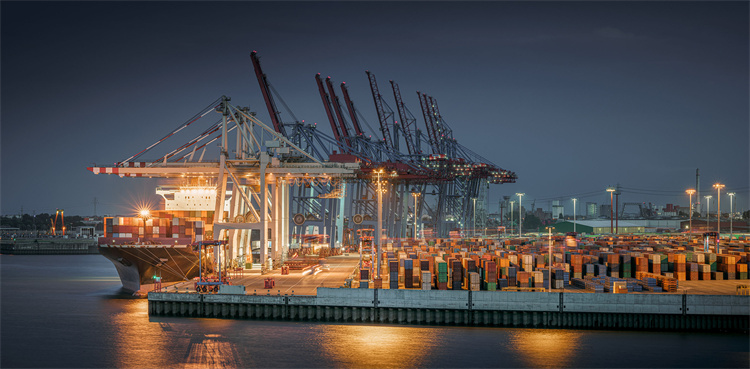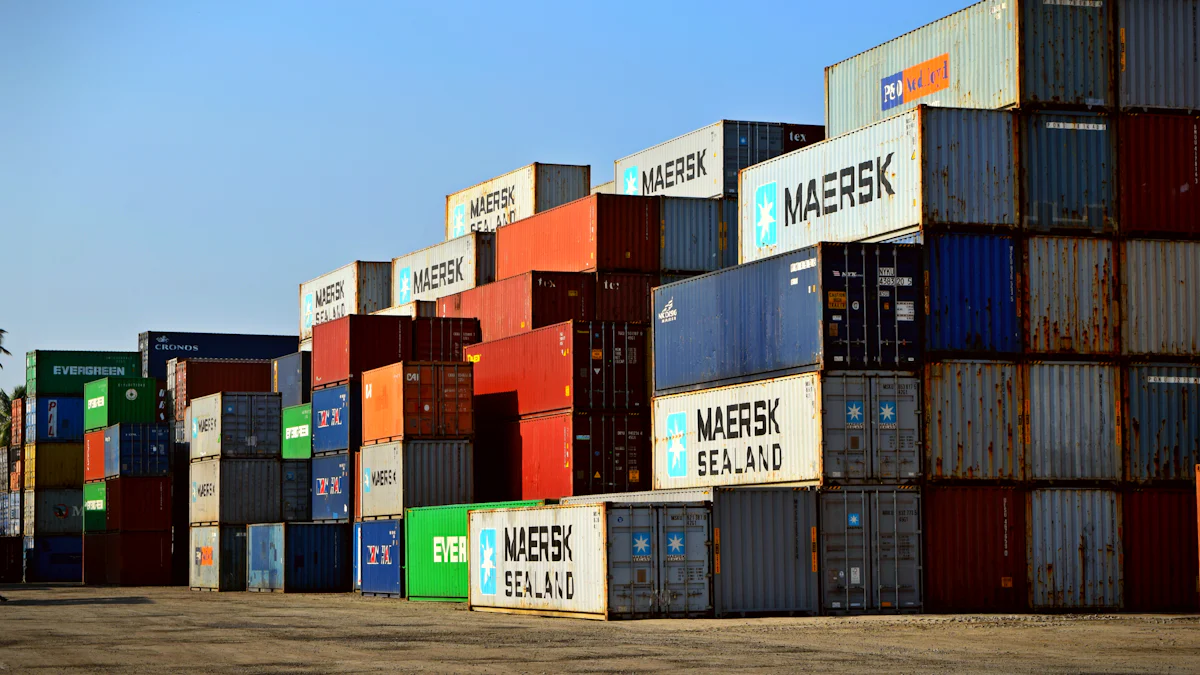Addressing Common End-to-End Supply Chain Challenges

An end-to-end supply chain encompasses all stages from raw material procurement to final product delivery. Effective supply chain management ensures seamless operations and customer satisfaction. Businesses with optimal supply chains experience 15% lower costs and three times faster cash-to-cash cycles. However, common challenges such as demand forecasting inaccuracies, inventory mismanagement, and supplier reliability issues often hinder efficiency. Addressing these challenges is crucial for maintaining a competitive edge in today's market.
Identifying Common End-to-End Supply Chain Challenges

Demand Forecasting in End-to-End Supply Chain
Inaccurate Predictions
Inaccurate demand predictions lead to either excess inventory or stockouts. Businesses struggle to align production with actual market demand. This misalignment results in increased costs and lost sales opportunities. Companies need accurate forecasting to maintain efficient operations.
Seasonal Variations
Seasonal variations pose another challenge in demand forecasting. Predicting demand during peak seasons requires precise data analysis. Many businesses fail to adjust their supply chain strategies for seasonal fluctuations. This failure often leads to either overstocking or stockouts, impacting profitability.
Inventory Management in End-to-End Supply Chain
Overstocking
Overstocking ties up capital and increases storage costs. Excess inventory can become obsolete, leading to significant financial losses. Efficient inventory management ensures optimal stock levels, reducing unnecessary expenses.
Stockouts
Stockouts result in lost sales and dissatisfied customers. Frequent stockouts damage a company's reputation and customer loyalty. Effective inventory management minimizes stockout occurrences, ensuring product availability.
Supplier Reliability in End-to-End Supply Chain
Quality Issues
Supplier quality issues disrupt the entire supply chain. Poor-quality materials lead to defective products and increased return rates. Companies must implement stringent quality control measures to ensure supplier reliability.
Delivery Delays
Delivery delays from suppliers cause production halts and missed deadlines. These delays increase operational costs and affect customer satisfaction. Reliable suppliers with consistent delivery schedules are crucial for maintaining an efficient end-to-end supply chain.
Logistics and Transportation in End-to-End Supply Chain
Route Optimization
Route optimization plays a crucial role in the end-to-end supply chain. Efficient route planning reduces fuel consumption and delivery times. Advanced route planning software helps companies identify the most efficient paths. This technology minimizes delays and ensures timely deliveries. Businesses must invest in these tools to enhance logistics efficiency.
Cost Management
Cost management remains a significant challenge in logistics. High freight costs and port congestion increase operational expenses. Companies need strategies to manage these costs effectively. Diversifying shipping methods and negotiating supplier costs can help. Sharing demand information with suppliers also reduces unnecessary expenses. Implementing these strategies leads to a more cost-effective end-to-end supply chain.
Regulatory Compliance in End-to-End Supply Chain
International Trade Regulations
International trade regulations impact the end-to-end supply chain significantly. Compliance with these regulations ensures smooth cross-border transactions. Non-compliance results in fines and shipment delays. Businesses must stay updated on international trade laws. Investing in compliance management systems helps companies navigate these regulations efficiently.
Environmental Regulations
Environmental regulations also affect the end-to-end supply chain. Companies must adhere to these regulations to avoid penalties. Implementing sustainable practices reduces environmental impact. Regular training and updates ensure that employees understand these regulations. Adopting eco-friendly practices enhances a company's reputation and ensures regulatory compliance.
Proposed Solutions for End-to-End Supply Chain Challenges

Advanced Analytics for Demand Forecasting
Machine Learning Models
Machine learning models revolutionize demand forecasting in the end-to-end supply chain. These models analyze vast amounts of data to predict future demand accurately. Businesses can reduce overstocking and stockouts by implementing machine learning algorithms. Accurate predictions ensure that companies align production with market needs. This alignment leads to cost savings and increased customer satisfaction.
Real-time Data Integration
Real-time data integration enhances demand forecasting accuracy. Integrating data from various sources provides a comprehensive view of market trends. Companies can respond quickly to changes in demand by using real-time data. This responsiveness minimizes disruptions in the end-to-end supply chain. Businesses that adopt real-time data integration gain a competitive edge in their industry.
Efficient Inventory Management Techniques
Just-In-Time (JIT) Inventory
Just-In-Time (JIT) inventory management reduces excess stock and storage costs. Companies receive goods only when needed for production, minimizing waste. JIT inventory ensures that businesses maintain optimal stock levels. This technique improves cash flow and reduces financial risks. Implementing JIT inventory leads to a more efficient end-to-end supply chain.
Automated Replenishment Systems
Automated replenishment systems streamline inventory management. These systems use advanced algorithms to predict when stock needs replenishing. Businesses can avoid stockouts and overstocking by automating the replenishment process. Automated systems enhance accuracy and efficiency in the end-to-end supply chain. Companies that invest in these technologies experience lower operational costs and improved customer satisfaction.
Enhancing Supplier Reliability
Supplier Audits
Supplier audits ensure that suppliers meet quality and delivery standards. Regular audits help identify potential issues before they impact the end-to-end supply chain. Companies can maintain high-quality standards by conducting thorough supplier evaluations. Supplier audits build trust and reliability in business relationships. Businesses that prioritize supplier audits minimize disruptions and improve overall supply chain performance.
Long-term Partnerships
Long-term partnerships with suppliers enhance reliability and collaboration. Building strong relationships with suppliers ensures consistent quality and timely deliveries. Companies benefit from better communication and problem-solving capabilities. Long-term partnerships create a stable and resilient end-to-end supply chain. Businesses that invest in these relationships achieve higher efficiency and customer satisfaction.
Optimizing Logistics and Transportation
Advanced Route Planning Software
Advanced route planning software revolutionizes logistics in the end-to-end supply chain. Companies use this technology to identify the most efficient delivery routes. Efficient routes reduce fuel consumption and minimize delivery times. Businesses that invest in advanced route planning software experience fewer delays. This investment enhances overall logistics efficiency.
Cost-effective Shipping Solutions
Cost-effective shipping solutions play a crucial role in managing logistics costs. High freight costs and port congestion increase operational expenses. Companies need strategies to manage these costs effectively. Diversifying shipping methods helps reduce expenses. Negotiating supplier costs also contributes to cost management. Sharing demand information with suppliers further minimizes unnecessary costs. Implementing these strategies leads to a more cost-effective end-to-end supply chain.
Ensuring Regulatory Compliance
Compliance Management Systems
Compliance management systems ensure adherence to international trade regulations. These systems help companies navigate complex regulatory landscapes. Non-compliance results in fines and shipment delays. Investing in compliance management systems mitigates these risks. Businesses that stay updated on trade laws ensure smooth cross-border transactions. This proactive approach enhances the efficiency of the end-to-end supply chain.
Regular Training and Updates
Regular training and updates keep employees informed about environmental regulations. Adhering to these regulations avoids penalties and enhances a company's reputation. Implementing sustainable practices reduces the environmental impact of the supply chain. Businesses that prioritize regular training ensure that employees understand compliance requirements. This commitment to sustainability strengthens the end-to-end supply chain.
Supply chain challenges such as demand forecasting inaccuracies, inventory mismanagement, and supplier reliability issues require strategic solutions. Advanced analytics, efficient inventory techniques, and robust supplier partnerships address these problems effectively. Continuous improvement remains essential for maintaining a competitive edge. Consulting experts emphasize the importance of data analytics and sustainability efforts in ensuring reliable operations. Implementing best practices in supply chain management will enhance efficiency and resilience. Businesses must act now to optimize their supply chains and achieve long-term success.
See Also
Overcoming Global Supply Chain Expansion Hurdles
Expert Guidance for Automotive Supply Chain Obstacles
Revolutionizing Supply Chain Management with Cloud Solutions
Efficiently Addressing High-Tech Manufacturing Supply Chain Challenges
